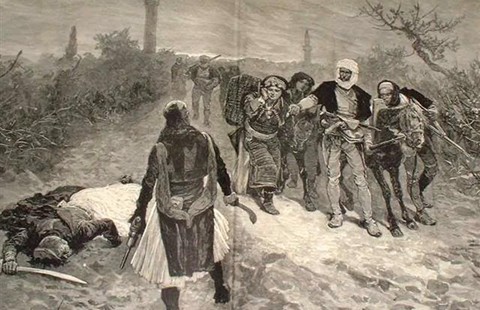
In reading about the persistence of clan feuding on Mindanao, we got to thinking about how governments can best end such cycles of revenge. Our natural assumption is that these feuds exist where organized justice is in short supply, and so familial units take over the role of punishing offenders. But a University of Maryland offers a different take here:
Extracting revenge by killing people and engaging in a blood feud is not, as one might be tempted to think, just a way to extract justice in absence of a judiciary system. It is, in fact, a way to send the signal that one’s clan (group) is ready to protect their right to exist without actually having to engage in a conflict over the means and sources of survival. The desire to send this signal and the inability of clans to read into other clans’ readiness to fight causes them to exchange more “signals” (killings) than they would have had they been fully informed about that readiness.
In such cases the access of all agents in a society to alternative economic activities, in which output is a function of individual e ffort rather than clan belongingness, is crucial in changing the valuations and payo ffs and breaking the socially inefficient path dependence. This might come through access to outside labor markets (migration) or through the accepted establishment of an authority that provides both economic welfare and protection. The new payo ff structure, if long-lasting, will provide incentives to the society to renegotiate and redesign new institutional arrangements, drifting away from the feud-perpetuating collective responsibility system.
The big caveat in all this, though, is that the creation of those “alternative economic activities” cannot be viewed as a blatant attempt to end the feuding. Clans do take pride in their reputations for ferocity, and thus recoil at the thought of being emasculated by a central government. The trick, as is so often the case, is to provide carrots that can be accepted without loss of face. Easier said than done, of course.


minderbender // Feb 23, 2010 at 1:26 pm
This reminds me of Eric Posner’s Law and Social Norms, which I read a long time ago and enjoyed quite a bit. These days I would probably want more evidence than I remember him providing in support of his hypotheses, but the book is thought-provoking at the very least.
In particular, I seem to remember that he described the duel as an institution that served the same function that courts serve today – contract enforcement, essentially. However, I also vaguely remember that he discussed duels as being embedded in an “honor society” equilibrium. Basically, you couldn’t back down from a duel (or, in certain circumstances, decline to challenge someone to a duel) because you would lose status. But of course, status is zero-sum, so it was essentially gratuitous violence. This bad equilibrium only dissolved when the social norms changed, so that dueling came to be seen as ridiculous rather than honorable (at which point it rapidly disappeared). That shift – the shift from honor society to modern society* – is one that I’m pretty damn grateful for, but I don’t know exactly how one would go about engineering it.
Anyway, dueling is not feuding, but both share some important characteristics, and possibly they disappear for similar reasons. You can read the dueling segment of Posner’s book in the free Google Books version (pp. 160-61), but I can’t find the discussion of the disappearance of dueling. Maybe I read it somewhere else.
*Not that we should see these changes as linear progress or our society as some kind of pinnacle of achievement. Or use words like “primitive” or “less developed” to describe other societies. But the fact remains that some aspects of honor societies are disgusting and we are well rid of them.
Brendan I. Koerner // Feb 23, 2010 at 6:34 pm
Thanks for the rec on the Posner. This post actually started with an idea about dueling–namely, how the decline of dueling had a positive economic impact on 19th-century America. But somehow my research steered me in more of a blood-feud direction, esp. once I learned about the situation on Mindanao.
There’s a lot of stuff out there re: Albania’s efforts to end blood feuds (somewhat unsuccessfully, I’m afraid). Expect another post soon.